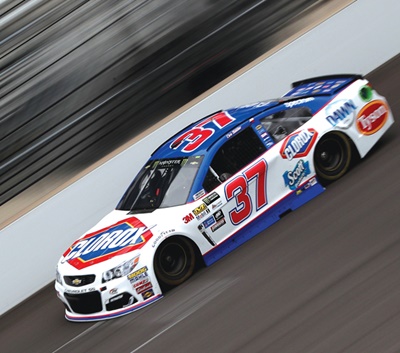A number of NASCAR charters are expected to change hands in what could be the busiest offseason since the charter system was introduced almost two years ago.
There is expected to be so much activity that one concern is that supply will outstrip demand and suppress pricing.
The system is now nearing the end of its second regular season of existence and prices for the charters — many of them from the sport’s less dominant teams — have been between $2 million and $3.5 million. Last season, for example, sources said that Tommy Baldwin Racing sold its charter to Leavine Family Racing for $3.5 million, while BK Racing sold one of its charters to Front Row Motorsports for around $2 million. A top-team charter likely would run closer to high seven figures into the low eight figures.
 |
JTG Daugherty Racing’s No. 37 is in the market for a charter.
GETTY IMAGES |
The charters guarantee entry into races and revenue from four different streams.
But industry sources are concerned about the number of charters that could hit the market as a number of teams are considering cutting back or facing instability for poor performance. That fuels speculation of a buyer’s market that could see the price of a charter slip to $1 million or less.
Most agree that the charters ultimately would be picked up by someone, since an owner can turn a profit by running a bare-bones car with costs less than the revenue it would get from purses and sponsorship. While some see the possibility of supply outstripping demand so soon as worrisome, others note that the system has at least established value for team owners outside of simple assets such as cars and machinery.
“The charter market for ’18 could be active,” said Rob Kauffman, co-owner of Chip Ganassi Racing and an architect of the system. “There’s definitely a floor on the values from the number of teams looking to enter the sport and have that certainty of cash flow from performance.”
Executives interviewed for this article maintain that the charter system was a crucial step in improving the sport’s business model, but that it was only one step and that further ones yet to be fully implemented remain. Under that thinking, the charters will only accrue in value once the wider issues — spiraling costs and heavy reliance on corporate sponsorship — are improved. Those factors are the ones that are mainly keeping outsiders from pouring their resources into the sport as new team owners or investors, the executives said.
“You’re not seeing a lot of growth by the more competitive teams,” Kauffman conceded, “so that’s probably putting a limit on the growth in charter values at this point.”
Eight transactions came last offseason, with four being outright sales and four being leases. NASCAR established the system with 36 charters that could be used in maximum 40-car fields, meaning four cars per race can make the field without a charter. Open cars make significantly less money than chartered cars, and less than half of the fields this year have featured the maximum of 40 cars. The charter system was set up under a five-year deal with a four-year option, meaning the sides likely couldn’t revisit the idea of whether they want to have less charters than 36 until after the 2020 season, even though such a move could raise their values.
This season, Team Penske has been in the market for a charter as part of an expansion plan, as it will go from two to three cars in the Monster Energy NASCAR Cup Series next year. Others, such as JTG Daugherty Racing, have been in the market for one because they leased a charter this season but can only do so for one season before it returns to the lessor, who then must sell or run it. But few competitive teams have declared that they will add cars for next year as of now, and a number of teams are looking to sell their charter. That includes Roush Fenway Racing, which leased its third charter this year to another team and now will have it back to either use or sell it this offseason.
“Following our announcement that we plan to continue our progression in the Cup series with two teams in 2018, we’ve received numerous unsolicited inquiries about either leasing or purchasing a charter from Roush Fenway,” Steve Newmark, president of Roush Fenway Racing, wrote in an email. “We have been pleased with what seems to be a robust market here, and look forward to seeing how the charter system continues to evolve.”




